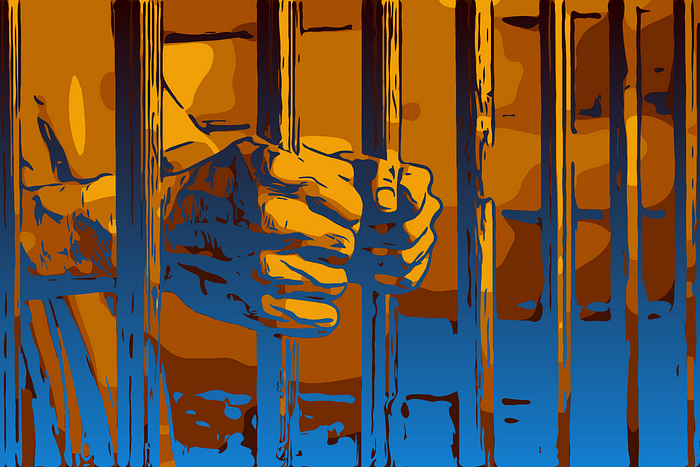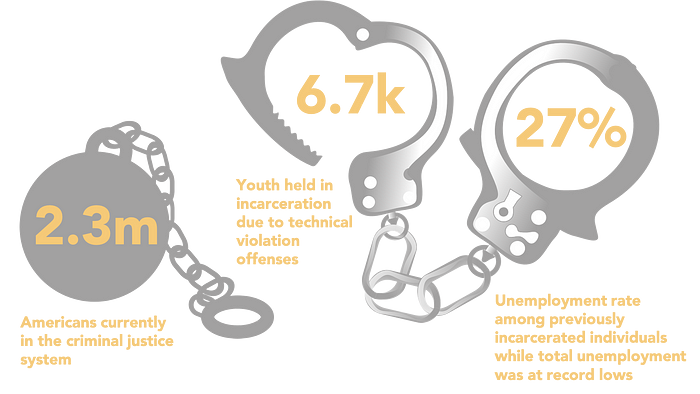Getting Dizzy in the Revolving Door; Let’s Talk Recidivism



The United States has the highest prisoner rate in the world, incarcerating 655 individuals per 100,000. Compare this to other OECD nations such as South Korea, Canada, and the U.K. whose rates per 100,000 are 106, 107, and 131, respectively. Turkey, the OECD country with the second highest rate, is still just over half the U.S. rate at 344 individuals per 100,000. The U.S. is home to less than 5% of the world’s population, but it houses 20% of its prisoners — why is that?
While a plethora of conflating reasons exist, one prevailing factor is the recidivism feature of our criminal justice system, often referred to as a “revolving door.” One would assume the criminal justice system is a linear process: an individual commits a crime, they serve time to correct behavior, and then rejoin society as rehabilitated persons. Unfortunately, it is often more accurate to depict the criminal justice system as a whirlpool which can pull people in with little hope for escape.
Meet Tom Barrett, a U.S. Army veteran who experienced opioid addiction after being prescribed pain medications for back problems, and who subsequently experienced years of homelessness. In 2012, Barrett stole a $2 can of soda from a convenience store and was arrested. Being unable to pay the $200 fine, Barrett was rearrested, with his subsequent probation adding additional fees that he was also unable to pay, which was then cause for another arrest. Around and around goes the door.
Unfortunately, Tom Barrett’s case is not unique. Rather, it exemplifies the ways in which individuals “revolve” in the criminal justice system once they enter it. In the first year following release, 43% of inmates are rearrested; 77% are rearrested within five years. A Pew Charitable Trusts study conducted on individuals released from prison in 1999 found that 25.5% of all released offenders were returned due to technical violations such as not paying a fine or not enrolling in substance abuse or mental health treatment within a certain timeframe. This number has remained stable over subsequent years and in some states, can exceed 50–60%. Many of these technical violations — such as not paying a fine or for treatment — require a job, something difficult to obtain once one has been incarcerated.
Even those recidivists that were not caught on a technicality are often rearrested due to offenses such as sleeping in public, panhandling, and public urination, all of which are related to homelessness — another commonality amongst those released from jail. Individuals who are incarcerated once are 7x more likely to experience homelessness, and those who are incarcerated twice are 13x more likely.
Further, as with any number of ailments in our country, recidivism dynamics are only exacerbated for communities of color. A Bureau of Justice Statistics found that of individuals born in the U.S. in 2001, 1 in 9 men and 1 in 56 women will experience incarceration. If we look specifically at the Black community, however, those numbers change to 1 in 3 and 1 in 18, respectively. Black men also have the highest rate of re-incarceration, despite having fewer of the risk factors associated with recidivism when compared to other groups.
While the problem is daunting, some companies and investors are rising to the challenge of addressing recidivism. For example, platforms have been developed to help individuals avoid technical violations and connect them with resources to prevent new offenses, and social impact bonds have been issued to finance programs to facilitate smooth reentry for previously incarcerated individuals. These welcome initiatives — combined with thoughtful policy changes — will hopefully begin to make a dent in the persisting problem of recidivism in this era of mass incarceration.
Madelyn OFarrell, Investment Analyst



Want to know more about some innovative ideas and initiatives taking place to address recidivism and reduce massive incarceration? See here: 5 New Policy Ideas for Fixing Life After Prison.

Acivilate provides an innovative digital solution, Pokket, to help formerly incarcerated individuals better transition back into society. Pokket connects individuals with essential services prior to release and provides a streamlined platform for connection between offenders and case managers, reducing potential for technical violations.

Check out this documentary to learn more about America’s overpopulated prisons and the disproportionate affect it has on the Black community.
Use this interactive map to view key figures about criminal justice in your home state.




This newsletter is intended solely for informational purposes, and should not be construed as investment/trading advice and are not meant to be a solicitation or recommendation to buy, sell, or hold any securities mentioned. Any reproduction or distribution of this document, in whole or in part, or the disclosure of its contents, without the prior written consent of Flat World Partners is prohibited.
Thank you for subscribing to our newsletter. Our privacy policy is available at anytime for you to review in order to understand how we protect your personal identifiable information. By subscribing to the newsletter you have consented to our policy.
